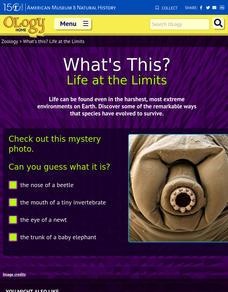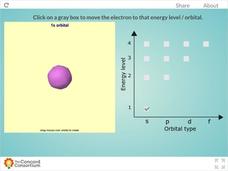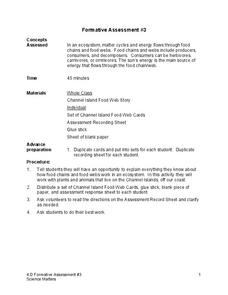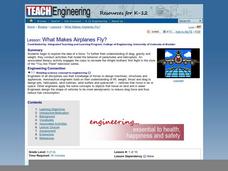Messenger Education
Exploring Solar Systems Across the Universe
Scientists have theorized that our solar system formed 4.6 billion years ago. In this pair of activities, learners first hypothesize how our solar system was formed. Using this information, groups then determine how scientists search for...
Mascil Project
Circular Pave-Stones Backyard
Pack the lesson into your plans. Young mathematicians learn about packing and optimization with the context of circular paving stones. They use coins to model the paving stones, and then apply knowledge of circles and polygons to...
American Museum of Natural History
What's This? Life at the Limits
There are some amazing ways species evolve to survive. From large ears to sneezing salt, learners read about these interesting adaptations in an interactive lesson. Great to supplement an in-class lesson, it also works well as a remote...
Curated OER
Endangered Species in the Sonoran Desert
Middle schoolers identify and explain some caused of endangerment and extinction for species as well as explain the effects of extinction on an ecosystem. Teachers use this lesson plan before teaching students about collecting insects or...
Curated OER
Bird Brilliance!
First graders explore natural resources and search outdoors to find materials to create a bird's nest. In this bird's natural resources instructional activity, 1st graders listen to a book about birds and reflect on the various things...
Learning to Give
It's Never Too Late: Air Quality
What are the causes and effects of pollutants on the quality of the air we breathe? Groups research emission standards, emission controls, career opportunities in the area of air quality control, and things government and individuals can...
University of Wisconsin
What’s a Square Foot Anyway? Laying Out the Design Plan
Clever! Participants don square-foot cardboard shoes to mark out the rain garden plot that they have spent the last few weeks designing. In this way, they are practicing scale modeling as well! Note that this lesson is part of a unit,...
Curated OER
Fabric Scrap Flower Garden
Crafting is fun, it increases eye-hand coordination, and it is a great way to accent any lesson. Celebrate Earth Day by creating scrap fabric flowers for a pop-stick flower garden. Children of all ages will love gluing, cutting, and...
Curated OER
Papier-Mâché Globe
Paper mache projects are great for using up paper from the recycle bin. Give your class the chance to create a three-dimensional globe out of paper mache. They'll work to make their globes as accurate as possible, adding proper colors...
University of Wisconsin
Designing a Rain Garden
Now it's time for all of the data collected in previous lessons to be applied to the design of a rain garden. This resource can only be used as part of the greater whole, since learners will need to rely on gathered knowledge in order to...
Bowels Physics
Waves and Sound
Explore how sound travels as waves with a straightforward lesson that explains the basics of waves in relation to sound. The presentation considers sound waves in both open and closed pipes and shows how to calculate wavelength and...
Santa Monica College
Flame Tests of Metal Cations
Scientists used flame tests to identify elements long before the invention of emission spectroscopy. Young chemists observe a flame test of five metal cations in the fourth instructional activity of an 11-part series. Individuals then...
Concord Consortium
Energy Levels of a Hydrogen Atom
Tired of blowing up countless balloons to illustrate orbital shapes around an atom? Give your lungs a break and use an interactive instead! Learners observe s, p, d, and f orbitals through the first four energy levels using hydrogen as a...
Science Matters
Formative Assessment #3
Thirteen short-answer questions follow a brief food web activity in a formative assessment designed to test knowledge of ecosystems and the energy that flows through them.
American Museum of Natural History
What is the Greenhouse Effect?
Without the greenhouse effect, Earth would not be inhabitable. A thorough online resource describes the greenhouse effect and how it occurs. The source highlights the different types of gases that work together to absorb the sun's...
Mathematics Vision Project
Quadratic Equations
Through a variety of physical and theoretical situations, learners are led through the development of some of the deepest concepts in high school mathematics. Complex numbers, the fundamental theorem of algebra and rational exponents...
Curated OER
Water and Ice
Students participate in various air experiments to understand that air is all around us. In this states of matter lesson, students focus on the role of air in the water cycle. Students understand that air is densest near the ground....
Curated OER
Our Amazing, Powerful Sun
Learners examine where energy comes from and how it can be used. In this solar energy lesson students explore different aspects of the sun.
Curated OER
Blazing Gas
Fourth graders read and discuss the sun and the energy we use on Earth from the sun. In this sun lesson plan, 4th graders discuss the solar system, planets, and answer short answer questions.
Curated OER
Water and Ice
Young scholars investigate how water goes from a solid to a liquid then back again. In this experimental lesson students conduct their own experiment and see how water changes form.
Curated OER
The Impact
Students study different inventors and inventions. In this invention introduction lesson students pretend that they are an inventor and come up with their own invention.
Curated OER
Solar System Hall Model
Not novel, but fun, this instructional activity gets your space science learners to model the size of the planets and the solar system along your school's hallway. Scaled measurements as well as actual distances are provided for both...
Curated OER
What Makes Airplanes Fly?
Students examine force and conduct activities that model parachutes and helicopters. In this airplanes instructional activity students identify the forces that make airplanes fly higher and land.
University of Colorado
Phases of Charon
Charon, the largest of Pluto's moons, was discovered in 1978. Lesson is a walk through of how to solve for the phases of Charon. It uses two different points on Pluto and takes into account the tilt of the pole, the rotational axis, and...

























